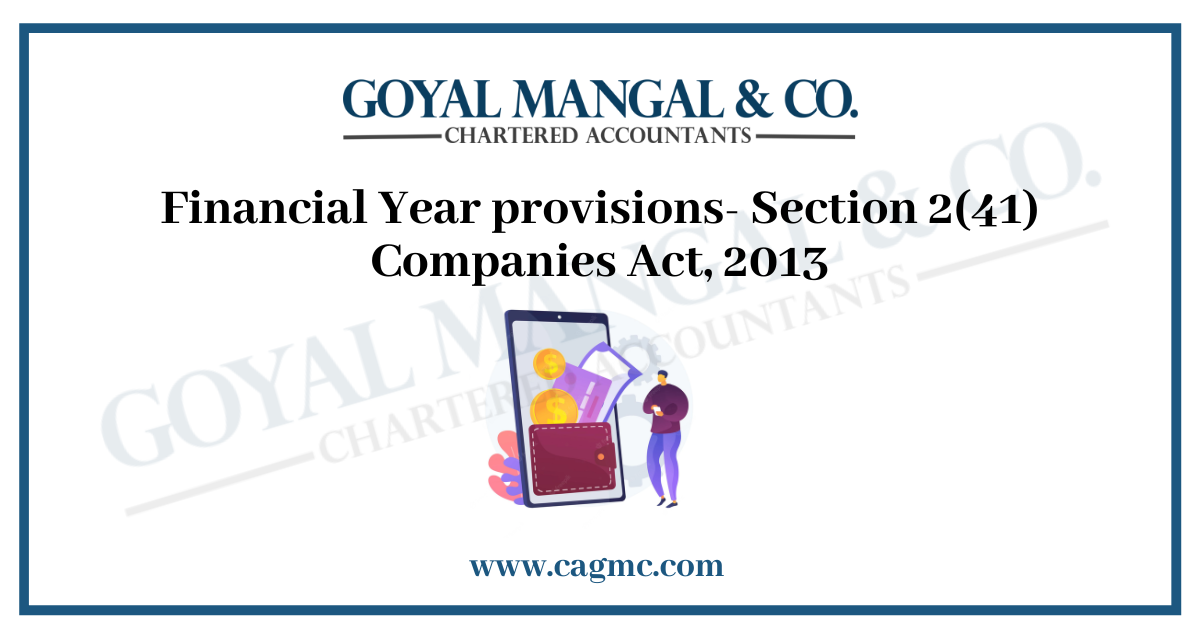
This article provides an analysis to the financial year provisions- Section 2(41) of the Companies Act, 2013.
Table of Contents
Section 2(41) of the Companies Act 2013
The above corporate provision, the 2013 Act does not give any direct power to the Registrar of Companies or CLB (Company Law Board) to extend the financial year for the purpose of harmonizing the existing company financial year with the provisions of section 2 (41). However, there will be confusion due to the initial provisions of section 2 (41) of the Act. The first provision of section 2 (41) requires the approval of the Company Law Board, only if the foreign-owned company is required to follow a different financial year to consolidate its accounts outside India, and the Company Law Board may, if satisfied, approve any period as its financial year whether that time is a year or not.
This means that no section 2 (41) or any other provision, law, under the Act requires any Indian company, other than a company or subsidiary of any company registered outside India, to obtain the approval of the Honorable Company Law Board. to regulate its financial year and the provisions of the Act.
In addition, the second provision of Section 2 (41) of the Act as mentioned above authorizes an existing company to comply with the financial year within two years from the commencement of this Act. As per the second principle of the said clause, the existing Company does not require the approval of the Registrar of Companies or the Company Law Board for consolidation.
The new law did not provide for any specific procedure to be followed in that alignment during the transition period. Also, it is a well-established legal practice that during a transition if the provision of a new law does not apply or does not provide for any particular provision or procedure to be complied with, then the corresponding provision of the old Act will apply until the transition period is over. The Companies Act, 2013, therefore, does not specify any extension for the financial year. Thus the corresponding provision of the old Act namely the Companies Act, 1956 relating to the financial year shall apply at the time of change.
Extension of Financial Year
Companies have three options for the extension of the Financial Year namely:
- Taking the ROC Accreditation in terms of section 210 (4) of the Companies Act, 1956 during corporate transformation as a practice followed by many ROCs including the Registrar of Companies, Maharashtra-Mumbai, State of Rajasthan, Chennai etc.
- To obtain CLB accreditation in terms of the first provision of section 2 (41) of the Companies Act, 2013 as directed by the Registrar of Companies, the NCT of Delhi and Haryana.
- Appeal to the Board’s Decision regarding the extension of the Financial Year without any requirement to seek the approval of any official under the Act.
But the different procedures of the different ROCs have confused companies to apply the same procedure for aligning the financial year in accordance with the requirement of the second principle of section 41 of section 2 of the Companies Act, 2013.
Annual General Meeting
In terms of Section 129 (2) of the Act, at all annual general meetings of the company the Board of Directors of the company must present before this meeting the financial statements for the financial year.
This means that the financial year depends on the periods during which the annual general meeting is held to present the financial statements for that financial year and to finalize their accounts. This brings us to the rules governing how often an annual general meeting must be held.
In terms of section 96 (1) of the Act, an annual general meeting must be held annually, i.e. every 12 months. But this period can be extended by 3 months to a total of 15 months from last year’s general meeting by board decision. This period may, with the approval of the ROC, in the exercise of its powers under Section 210 (4) and under the second provision under Section 166 (1), be extended for a further period of 3 months. The company can therefore successfully extend its financial year to 15 months without the need to obtain approval from the CLB or ROC.
Final words
In consultation with the various ROCs officials, it has been understood that while rejecting or accepting an application for this set of objectives automatically states the reference to Section 210 (4) of the Companies Act, 1956.
It is also believed that during the transition period if the provision of a new law does not provide any specific provision or procedure to be complied with, then the corresponding provision of the old Act will apply until the transition period. The Companies Act, 2013, therefore, does not specify any extension for the financial year. In accordance with the corresponding provisions relating to the financial year of the old Act namely, the Companies Act, 1956 shall apply at the time of the change.
Another consideration may be taken into account in view of the fact that as Section 210 of the Companies Act, 1956 is repealed and there is no corresponding provision namely section 129 or section 2 (41) of the Companies Act, 2013 which prescribes any procedure prescribed. The company can therefore adjust its financial year on its own by approving the board’s decision.
The MCA should therefore come up with a specific explanation on this issue so that all companies and ROCs follow the same practice.







